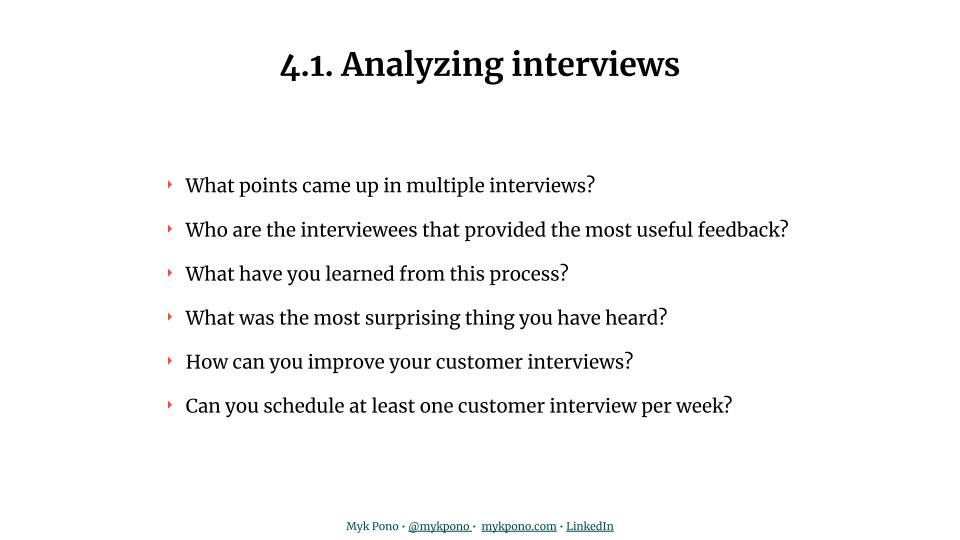Course 4.1: Customer Interviews | Analyzing Your Customer Interview Data

4.1. Analyzing Your Customer Interview Data
So far, we’ve talked about planning your customer interviews, setting them up, and conducting them. Now that the interviews are over, what do you do?
In this section, we’ll talk about summarizing and analyzing feedback.
One of the first things to do is to make sure you have summaries of all the interviews you’ve conducted so that you can reference each conversation quickly.
After every interview, I write down the name of the person I spoke to, their company, and a few bullet points on the most important topics of the conversation. When it’s time to analyze everything, I don’t want to have to go back and watch every single video or listen to every single call. I want to be able to recall quickly who said what.
Then, I take all of these summaries and look at them as a whole to see if any patterns emerge. There are a few ways to do this.
First, I’ll look for any points that came up in multiple interviews.
If the same issues are coming up multiple times, across subjects and companies, that’s a good sign that I need to dig a little deeper into why they’re saying what they’re saying.
For example, when we conducted interviews about content production processes for Publishnow, we kept hearing that the vast majority of companies used Google Docs to create their content.
Every good article requires an image or diagram. After teams add the image to the Google Doc, it becomes a challenge to find the location of the original image.
That’s because Google Docs doesn't allow you to download the image when it was inserted in the doc. I came across this issue myself but we were surprised to learn how many writers are frustrated with this.
This insight allowed us to refocus our priorities and build an integration with Google docs that would export content and images seamlessly into our content publishing platform.
I’ll also compare notes and summaries to the hypothesis I set when I was preparing for interviews. Do the trends I’m seeing line up with what I expected to see?
If not, it’s valuable to start thinking about why they don’t. I’ll also ask myself which interviewees provided me with the most useful feedback.
That’s because I might want to follow-up with them or dig more into the specific insights they shared.
There’s a good chance that their feedback will be most relevant to the questions I’m trying to answer.
On a related note, another good question to ask yourself is, “What was the most surprising thing I heard in my interviews?”
I believe that if you aren’t being surprised, you aren’t talking to the right people.
If everything you hear is something you expected, there’s a good chance you’re talking to the same type of people over and over again about problems you’ve already heard about. If you aren’t diversifying your pool of subjects, you’re not learning anything.
Taking all of that together, I’ll ask myself what I learned from the interviews. Or better yet, I’ll ask myself if I’ve actually learned anything in the first place.
If I review my interview summaries and see that responses to my questions are all over the board, I might conclude that I interviewed the wrong people, or that I asked the wrong questions - and that, as a result, my data isn’t strong enough to base decisions on.
Unfortunately, it’s possible to conduct 20 or more interviews and not have anything meaningful to show for it.
Let’s imagine that for my content marketing software, I interviewed 20 different people with the title “Head of Content.”
Maybe some of them work for marketing agencies, while others work for SMBs or enterprise organizations, or even Fortune 500 companies.
If they all give me different answers, I might not be able to draw any real conclusions from the data I’ve gathered. OR you might be after the problem that doesn't occur often enough.
Don’t be precious about your data. If they’re telling you that any trends you see aren’t strong enough to draw conclusions, don’t try to force them into place just to have something to show for your work.
In this next video we’ll talk about how to improve your interviews in case this does happen.
Analyzing interviews
- What points came up in multiple interviews?
- How do these points compare to what you expected to hear in your hypothesis?
- Who are the interviewees that provided the most useful feedback?
- What was the most surprising thing you have heard?
- If you aren't being surprised, you're talking to the same type of people (SMB/enterprise, customer/prospect) or problems you've already heard about it
- What have you learned from this process?
- Have you learned anything from this process?
- EX: if responses to your questions are all over the board, you might conclude that the data generated from your customer interviews isn’t strong enough to base decisions on
